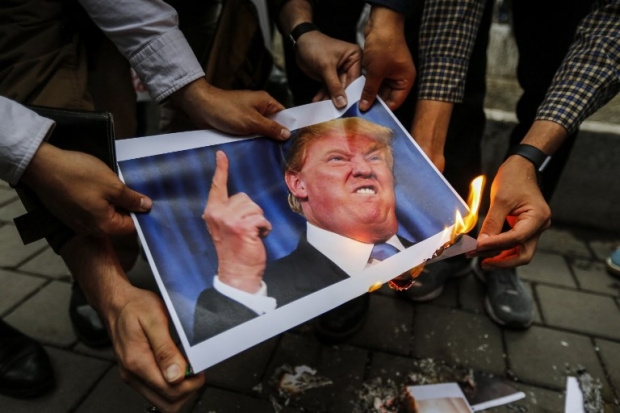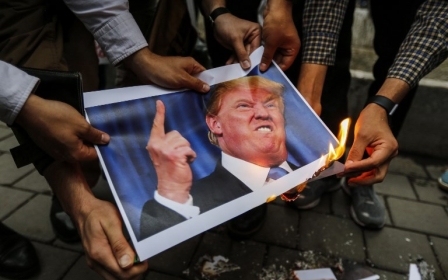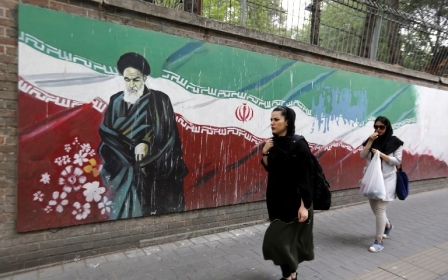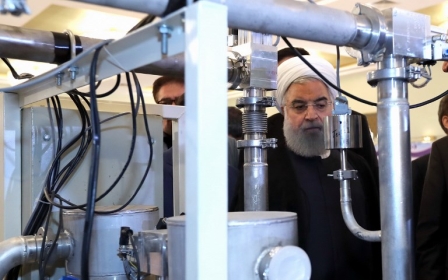Khamenei miscalculates in playing chess with elephant Trump
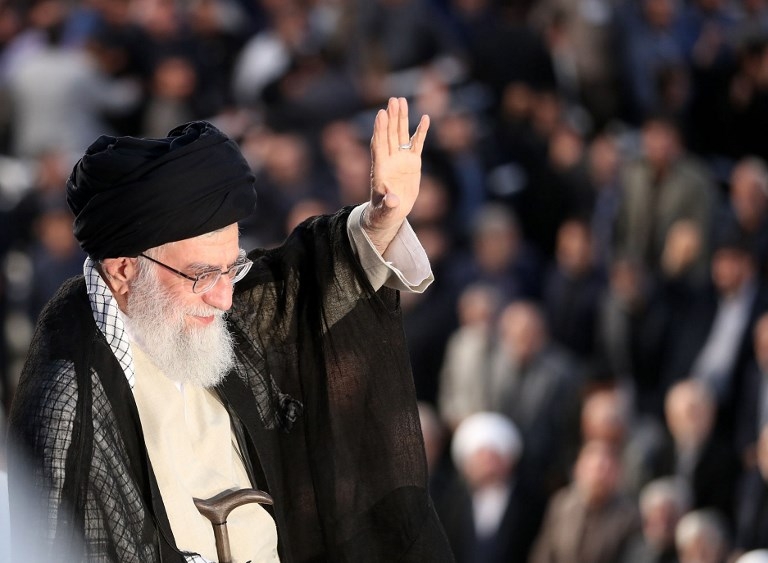
On 4 June, Iran’s leader, Ayatollah Ali Khamenei, addressed thousands of people at a ceremony to commemorate the 29th anniversary of the death of the founder of the Islamic Republic, Ayatollah Ruhollah Khomeini.
Khamenei took to the podium and said that to expect “the Iranian nation to both endure the sanctions and … to live on with the restrictions already imposed” on its nuclear programme is a “disturbing dream [that] will not come true.”
On 8 May, US president Donald Trump, in a perplexing move that violated an international agreement and a UN resolution, unilaterally withdrew from the Iran nuclear deal, known as the Joint Comprehensive Plan of Action (JCPOA). Trump’s announcement marked a decisive break from the deal that the US agreed to in July 2015 with its main European partners, Russia, China and Iran.
Sweeping sanctions
In that deal, Tehran agreed to significantly curb its nuclear programme in return for sanctions relief. Soon after, the deal was endorsed by a UN Security Council resolution.
Trump also announced that he would impose “the highest level of economic sanctions“ on Iran and warned that “any nation that helps Iran in its quest for nuclear weapons could be strongly sanctioned”. Following Trump’s statements, the US Treasury issued a factsheet providing a timetable for the reintroduction of sweeping sanctions against any and all foreign companies trading with or investing in Iran.
Declaring the deal void and expanding the nuclear programme at an accelerating speed in retaliation against the restoration of sanctions by the US ... could lead to two disastrous outcomes
Khamenei’s statements were in response to Trump’s move and a warning to the Europeans: if they do not tame the Americans’ behaviour or neutralise the effects of US sanctions, Iran will abandon the nuclear deal and its commitments under the JCPOA will come to an end.
It is understandable that Khamenei faces the most complex crossroads of his political career. It would be extremely costly and inflict significant damage to his stature among his followers if he were to, as the symbol of resistance against the “global arrogance”, ignore the imposition of new sanctions by the Americans.
However, declaring the deal void and expanding the nuclear programme at an accelerating speed in retaliation against the restoration of sanctions by the US – as happened between 2003 and 2013 – could lead to two disastrous outcomes.
The ‘lie’ of war
Khamenei has repeatedly said, and wholeheartedly believes, that war is not an option for the Americans. In his 4 June speech, he said: “Foreign governments are after this, and some people inside the country promote the same idea, that if this [JCPOA] does not work, there will be a war. No, this is a lie! This is promoting the interests of the enemy.” He added: “Today, our youth have managed to become the first missile power in the region. The enemy knows that if he launches one, he will receive ten.”
Since the George W Bush era, during which Iran and the US came to the brink of war, one could read between the lines of the statements made by Iranian military officials that Americans would not dare to attack Iran for three reasons.
First, the vulnerability of US personnel and assets in the region: Iranian Revolutionary Guard Navy Commander Admiral Ali Fadavi said in April that the Americans would eventually learn that they have less information about Iran than they thought “when their ships are sunk or when they find themselves in a catastrophic situation”.
The second reason is the vulnerability of Israel, primarily because of its size and the fact that it cannot tolerate thousands of missiles hitting its cities.
Finally, there is the vulnerability of the Strait of Hormuz, which by volume of oil transit, is the world’s most important chokepoint, according to the US Energy Information Administration. The Iranians believe they can close it.
American unpredictability
Even if Khamenei’s evaluation is correct, based on his theory, no war would have occurred in history based on miscalculations. In fact, however, many experts believe that “war can occur without misperception, but rarely”. By misperception, they mean inaccurate inferences, miscalculations of consequences, and military optimism - that is, overestimating one’s capabilities and underestimating the enemy’s.
What Khamenei must realise is that he is dealing with a US president who does not abide by international norms, has appeared strong in making controversial, illogical and unorthodox decisions, and is completely unpredictable.
The second scenario that Iran’s exit from the nuclear deal may lead to is a social and political internal explosion. Since last December, when unprecedented street protests sparked by economic hardships erupted in 80 cities across Iran, labour strikes and worker protests have become prevalent across the country. Recent outbreaks of unrest, including some instances of blocking intercity roads, are an indication of the deepening discord over the country’s economic conditions. Inflation, which was under control during President Hassan Rouhani’s first term, is increasing at a startling rate.
Rouhani’s failed promises following the conclusion of the nuclear deal have caused tremendous pressure within the lower socioeconomic layers of Iranian society. Rouhani and his team largely counted on foreign investment and foreign corporations racing to work with Iran once the sanctions were lifted.
But now, even before the American sanctions come into effect - which will partially occur in August and the rest in November - 17 large European corporations have ended their deals with Iran, including Airbus, shipping giant Maersk and French oil giant Total, according to the Tasnim News Agency, which has strong links with the Iranian Revolutionary Guards Corps.
Social unrest
The mother of the current economic crisis - besides mismanagement, which is a chronic disease in the Iranian system - is a slump in the value of Iran’s rial amid economic and political uncertainty. This trend suddenly accelerated after the Trump announcement.
Iranian analyst Abbas Abdi maintained in a 1 June interview that at “any moment, unpredictable incidents can occur in the country”. He added that the “economy is facing a crisis. The government, which is tasked to maintain order in society, is not clear if it can do so if the social unrest widens … We are moving towards a dead end. Society will not keep silent. It will react.”
We are moving towards a dead end. Society will not keep silent. It will react
- Iranian analyst Abbas Abdi
The predictable scenario in the coming months is the beginning of a tit-for-tat process between Iran and the US. Khamenei believes that if Iran resists increasing US pressure and expands Iran’s nuclear programme, the Americans will eventually capitulate and decide to work with Iran, as they did under former President Barack Obama.
But this time, his calculus may prove wrong, as he is playing chess with an elephant. In such an eventuality, the country will face serious threats, both externally - in the shape of a military conflict - and internally, by waves of unrest.
- Shahir Shahidsaless is an Iranian-Canadian political analyst and freelance journalist writing about Iranian domestic and foreign affairs, the Middle East and US foreign policy in the region. He is the co-author of Iran and the United States: An Insider’s View on the Failed Past and the Road to Peace. He is a contributor to several websites with a focus on the Middle East, as well as the Huffington Post. He also regularly writes for BBC Persian. He tweets @SShahisaless.
The views expressed in this article belong to the author and do not necessarily reflect the editorial policy of Middle East Eye.
Photo: Iranian Supreme Leader Ayatollah Ali Khamenei greets a crowd during a ceremony on the anniversary of the death of the founder of the Islamic Republic, Ayatollah Ruhollah Khomeini, in Tehran on 4 June 2018 (HO/Khamenei.IR/AFP)
New MEE newsletter: Jerusalem Dispatch
Sign up to get the latest insights and analysis on Israel-Palestine, alongside Turkey Unpacked and other MEE newsletters
Middle East Eye delivers independent and unrivalled coverage and analysis of the Middle East, North Africa and beyond. To learn more about republishing this content and the associated fees, please fill out this form. More about MEE can be found here.



